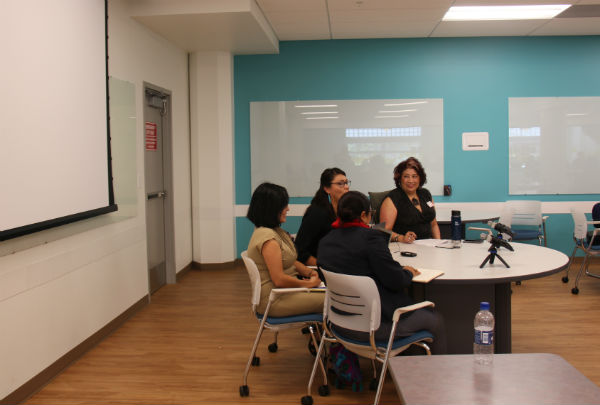
Recipient Kim TallBear and panel at the Indigenous STS Symposium, 2018
The Kule Institute for Advanced Study (KIAS) has announced the recipients of the 2019 Kule Research Cluster Grants. These grants support sustained activities of interdisciplinary research teams in the social sciences, humanities and fine arts that have the potential to be recognized as excellent at the national or international level.
The three projects that were awarded grants are:
Kim TallBear and Jessica Kolopenuk (Native Studies): Indigenous Science, Technology, and Society Research and Training Network (award amount: $70,000)
Jared Wesley (Political Science): Alberta Political Culture Project (award amount: $70,000)
Andie Palmer (Anthropology) and Lianne Lefsrud (School of Engineering and Risk Management): New Approaches to Communities, Communication and Consultation through the Lens of Geothermal Energy Development on the Traditional Lands of the Alexis Nakota Sioux Nation (award amount: $35,000)
The Indigenous STS Research and Training Network is an international interdisciplinary research and training team whose central node is located here in the Faculty of Native Studies at the University of Alberta.
The goal of Indigenous STS, explained Kolopenuk, is to increase scientific literacy and capacity among Indigenous peoples, within the academy and also beyond. The standard thinking around this capacity building, she said, is that it's a one way direction, supporting capacity among Indigenous peoples. Kolopenuk emphasized, however, that institutions also greatly need capacity building.
"[This grant] means a lot, as part of it is going to help us build our network, so that we can help to build the capacity of the institution itself to do research that ethically engages with Indigenous peoples and communities," said Kolopenuk.
The Kule Research Cluster grant will also enable the Indigenous STS team, TallBear and Kolopenuk, to hire a research assistant to help organize for bigger funding packages they will be applying for in the next few months. It will also provide support for the team to travel to UC Santa Cruz to observe and network with the Science and Justice Training Program there.
"We're not starting from scratch, there's a tested administrative structure with the Science and Justice Training Program. We'll work to create an Indigenous framework for thinking about what constitutes ethical science and technology, and figure that out conceptually, but administratively there's a lot to be learned from them," said TallBear.
The network-building involved in the project also extends to building cross-disciplinary relationships with the science faculties here on campus, said TallBear.
"Building those relationships with the scientific fields is really crucial and important to access the kinds of knowledge and expertise that they have, but also then to share the knowledge that we have with them to hopefully challenge and build their fields in good ways," explained Kolopenuk.
Learn more about the Kule Research Cluster Grant recipients here.